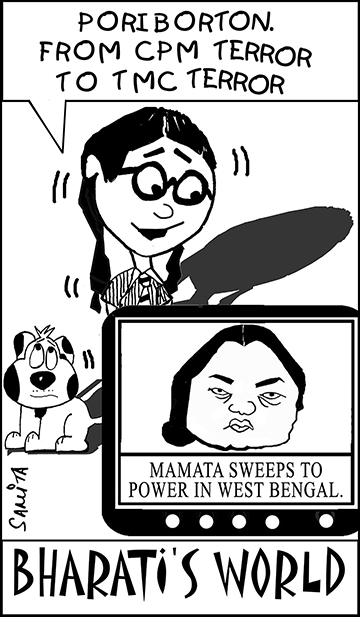 Although leaders of the ruling BJP-Shiv Sena alliance in Maharashtra — the country’s most industrialised state — claim credit for the Central government’s May 24 ordinance which defers applicability of the National Eligibility-cum-Entrance Test (NEET) by a year, the battle is far from over for students aspiring to enter the state’s medical and dental colleges. Most of the 125,000 students who wrote the Maharashtra Common Entrance Test (MH-CET) held on May 5, will still have to write the second phase of NEET on July 24. The first phase of NEET, which will become the sole entrance exam for admission into all medical and dental colleges countrywide next year, was held on May 1 following a Supreme Court judgement of April 28.
Although leaders of the ruling BJP-Shiv Sena alliance in Maharashtra — the country’s most industrialised state — claim credit for the Central government’s May 24 ordinance which defers applicability of the National Eligibility-cum-Entrance Test (NEET) by a year, the battle is far from over for students aspiring to enter the state’s medical and dental colleges. Most of the 125,000 students who wrote the Maharashtra Common Entrance Test (MH-CET) held on May 5, will still have to write the second phase of NEET on July 24. The first phase of NEET, which will become the sole entrance exam for admission into all medical and dental colleges countrywide next year, was held on May 1 following a Supreme Court judgement of April 28.
The Centre’s ordinance, which came in the wake of widespread protests by parents and students, only ‘partially’ affects the Supreme Court’s April 28 verdict which made NEET mandatory for admissions into all government colleges, deemed universities and private medical colleges countrywide. According to the ordinance, the results of CETs held by state governments are useful only for admission into their own state government colleges. They are not acceptable for admission into private medical colleges which are obliged to admit students on the basis of NEET scores.
Obviously for the great majority of Maharashtra’s 125,000 aspiring medicos who wrote MH-CET in early May, this half-way house ordinance is unsatisfactory. The 18 government medical colleges in the state will admit only 2,810 of them. Additionally, 3,395 seats are available in the state’s deemed and private medical/dental colleges promoted by edupreneurs — mainly well-heeled politicians — highlighting the severe shortage of medical education institutions in the country’s most industrialised state.
“With 50 percent of the 2,810 government college seats reserved for scheduled caste, scheduled tribe and OBC students, the number of seats available for merit students is a mere 1,400 odd. Therefore the remaining 122,000 who wrote MH-CET — most of them in the general merit category — will have to write NEET-II,” says Dr. Keyur Cholera, director of Mindsetters, a medical entrance exams tutorial company, who spearheaded parents’ protest against NEET.
Prior to NEET, aspiring medical practitioners in the state were obliged to write numerous entrance exams — MH-CET, Asso-CET (conducted by the Association of Managements of Private Medical and Dental Colleges for admission into private unaided colleges affiliated with the Maharashtra University of Health Sciences) and separate entrance tests of deemed universities.
“Students prefer government to private medical colleges because of their highly subsidised tuition fees and huge patient turn-out in attached free hospitals which offer greater hands-on learning experience. On the other hand, most private colleges and deemed universities are notorious for demanding ‘donations’ aka capitation fees as a quid pro quo for admission. Their entrance exams are a farce,” says a Mumbai-based government college head, speaking on condition of anonymity.
It was precisely with the intention of eliminating capitation fees in private colleges that NEET was first proposed in 2010 but rejected on considerations of federalism and states’ autonomy in 2010. But on April 28, a three-judge bench (Justices Anil R. Dave, Shiva Kirti Singh and A.K. Goel) overruled the apex court’s earlier judgement and upheld NEET on grounds that it will save students the trouble of writing multiple state government and private colleges entrance tests, and curb the capitation fees menace.
But even as most academics in Maharashtra have begun to accept the logic of implementing NEET, a new debate has sprung up on whether the state’s students who follow the Higher Secondary Certificate (HSC) board syllabus will be able to cope with NEET which will be designed by the Delhi-based Central Board of Secondary Education (CBSE). “More than 80 percent of the state’s higher-secondary students follow the state board syllabus. The curriculums and assessment of CBSE and HSC boards differ on many counts. Unless the state board syllabus is raised to CBSE standards and students become accustomed to CBSE-style assessment, HSC students will be at a disadvantage when writing NEET. NEET would be best implemented in 2018,” says Dr. Rajpal Hande, principal of Mithibai College of Arts, Mumbai.
Quite obviously, the apex court’s sanctification of NEET which abolishes multiple test-taking and rent-seeking won’t be painless. But no pains, no gains.
Dipta Joshi (Mumbai)